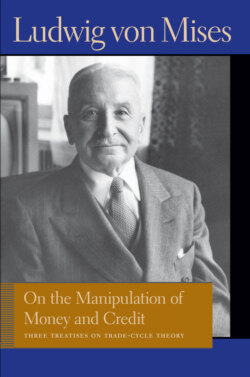Читать книгу On the Manipulation of Money and Credit - Людвиг фон Мизес - Страница 13
На сайте Литреса книга снята с продажи.
4. The Run from Money
ОглавлениеThe divorce of trade from a money that is proving increasingly useless begins with its being replaced from the hoards. If people want marketable goods available to meet unanticipated future needs, they start to accumulate other moneys—for instance, metallic (gold and silver) moneys, foreign notes, and occasionally also domestic notes which are valued more highly because their quantity cannot be increased by the government, such as the Romanov ruble of Russia or the “blue” money of Communist Hungary.4 Then too, for the same purpose, people begin to acquire metal bars, precious stones and pearls, even pictures, other art objects and postage stamps. An additional step in displacing a no-longer-useful money is the shift to making credit transactions in foreign currencies or metallic commodity money which, for all practical purposes, means only gold. Finally, if the use of domestic money comes to a halt even in commodity transactions, wages too must be paid in some other way than with pieces of paper with which transactions are no longer being made.
Only the hopelessly confirmed statist can cherish the hope that a money, continually declining in value, may be maintained in use as money over the long run. That the German mark is still used as money today [January 1923] is due simply to the fact that the belief generally prevails that its progressive depreciation will soon stop, or perhaps even that its value per unit will once more improve. The moment that this opinion is recognized as untenable, the process of ousting paper notes from their position as money will begin. If the process can still be delayed somewhat, it can only denote another sudden shift of opinion as to the state of the mark’s future value. The phenomena described as frenzied purchases have given us some advance warning as to how the process will begin. It may be that we shall see it run its full course.
Obviously the notes cannot be forced out of their position as the legal media of exchange, except by an act of law. Even if they become completely worthless, even if nothing at all could be purchased for a billion marks, obligations payable in marks could still be legally satisfied by the delivery of mark notes. This means simply that creditors, to whom marks are owed, are precisely those who will be hurt most by the collapse of the paper standard. As a result, it will become impossible to save the purchasing power of the mark from destruction.
